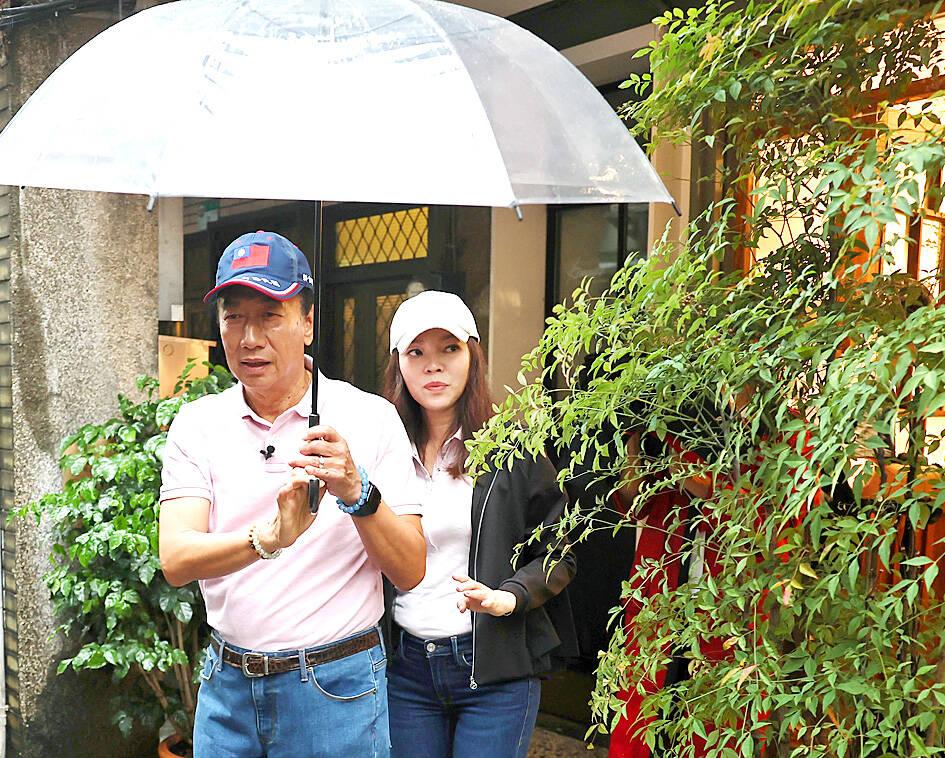Hon Hai Precision Industry Co founder Terry Gou (郭台銘), an independent presidential candidate, said Taiwan’s demographic crisis could be solved by giving new parents a cat or dog.
In an early sign of how his campaign might run, Gou told attendees at a Taipei temple on Friday that the declining birthrate could be addressed by giving new parents a cat or dog.
Taiwan has one of the world’s lowest birthrates, with many people citing the high cost of living, difficulties in accessing childcare and traditional gender expectations.

Photo: CNA
Meanwhile pet ownership is skyrocketing, with anecdotal reports suggesting many couples are choosing animals over children. However, Gou felt people could be motivated to take on both.
“Give birth to a child and I will let you raise one more pet,” he said, according to a translation by Formosa TV. “A cat, a dog. Give birth to two, and I will let you adopt two more.”
Getting a pet does not require government permission.
Gou said he had recently visited an animal shelter and felt that two issues could be solved together.
“If the birthrate falls too low in the future, who will take care of our furry friends?” he told reporters later. “So I hope to tackle these two issues together. You cannot expect me, one person, to propose a complete policy for every little matter. Adding and multiplying love, that is my goal.”
The proposal was criticized by some Democratic Progressive Party politicians and animal welfare groups.
Gou said that during the last presidential election, he had proposed government subsidies for childbearing costs up to the age of six, but it was not implemented.
Gou’s campaign has been contacted for comment.
Animal rights group People for the Ethical Treatment of Animals senior vice president Jason Baker said: “Animals are not gifts or prizes; they are living, feeling beings who require proper love, care, and attention for a lifetime.”
“Adopting an animal is an important decision that should be made carefully,” he said. “This responsibility may prove too much for people who are already taking care of a new baby, and they may end up taking the animals to already overburdened local shelters — or worse, abandoning them outdoors to fend for themselves.”
See stories on page 8

The first global hotel Keys Selection by the Michelin Guide includes four hotels in Taiwan, Michelin announced yesterday. All four received the “Michelin One Key,” indicating guests are to experience a “very special stay” at any of the locations as the establishments are “a true gem with personality. Service always goes the extra mile, and the hotel provides much more than others in its price range.” Of the four hotels, three are located in Taipei and one in Taichung. In Taipei, the One Key accolades were awarded to the Capella Taipei, Kimpton Da An Taipei and Mandarin Oriental Taipei. Capella Taipei was described by

The Taichung District Court yesterday confirmed its final ruling that the marriage between teenage heir Lai (賴) and a man surnamed Hsia (夏) was legally invalid, preventing Hsia from inheriting Lai’s NT$500 million (US$16.37 million) estate. The court confirmed that Hsia chose not to appeal the civil judgement after the court handed down its ruling in June, making the decision final. In the June ruling, the court said that Lai, 18, and Hsia, 26, showed “no mutual admiration before the marriage” and that their interactions were “distant and unfamiliar.” The judge concluded that the couple lacked the “true intention of

EVA Airways today confirmed the death of a flight attendant on Saturday upon their return to Taiwan and said an internal investigation has been launched, as criticism mounted over a social media post accusing the airline of failing to offer sufficient employee protections. According to the post, the flight attendant complained of feeling sick on board a flight, but was unable to take sick leave or access medical care. The crew member allegedly did not receive assistance from the chief purser, who failed to heed their requests for medical attention or call an ambulance once the flight landed, the post said. As sick

INDUSTRY: Beijing’s latest export measures go beyond targeting the US and would likely affect any country that uses Chinese rare earths or related tech, an academic said Taiwanese industries could face significant disruption from China’s newly tightened export controls on rare earth elements, as much of Taiwan’s supply indirectly depends on Chinese materials processed in Japan, a local expert said yesterday. Kristy Hsu (徐遵慈), director of the Taiwan ASEAN Studies Center at the Chung-Hua Institution for Economic Research, said that China’s latest export measures go far beyond targeting the US and would likely affect any country that uses Chinese rare earths or related technologies. With Japan and Southeast Asian countries among those expected to be hit, Taiwan could feel the impact through its reliance on Japanese-made semi-finished products and